Manga: Prison School, 監獄学園 (Chapter 168)
Usage
The word kimochi 気持ち is generally used to talk about "feeling" in the emotional sense. Psychological.You don't use it to talk about how "silk feels soft," for example, because that would refer to the physical attribute of the silk. But you can use it to say "silk feels good," because comfort is psychological.
"How I Feel"
The most obvious one is to say "how I feel" in Japanese, that is, to talk about somebody's "feelings."- watashi no kimochi 私の気持ち
ore no kimochi 俺の気持ち
boku no kimochi 僕の気持ち
My feelings. - anata no kimochi あなたの気持ち
kimi no kimochi 君の気持ち
omae no kimochi お前の気持ち
Your feelings. - kare no kimochi 彼の気持ち
His feelings.
[Your] boyfriend's feelings. - kanojo no kimochi 彼女の気持ち
Her feelings.
[Your] girlfriend's feelings. - aitsu no kimochi あいつの気持ち
His feelings. Her feelings.
Often, these "feelings" are romantic feelings, but they can be feelings of anger, sadness, etc.
Manga: Prison School, 監獄学園 (Chapter 168)
- Context: a girl is conflicted.
- n? nanda.. kono kimochi wa..
ん?なんだ・・この気持ちは・・
Hm? What is it.. this feeling..- In my chest..??!!
Of course, feeling is a personal thing, so nobody knows how you feel unless you tell them.
- kimochi wo tsutaeru 気持ちを伝える
To convey [one's] feelings. - kimochi ga tsutawaru 気持ちが伝わる
The feelings [are conveyed].- tsutawaru 伝わる
Intransitive variant of the transitive verb tsutaeru.
- tsutawaru 伝わる
"How Someone Thinks"
Another way kimochi 気持ち is used is to refer to the way "how someone thinks." That's because what you "feel" about something is essentially what you "think" about something.In particular, understanding someone's kimochi is usually about understanding why they think in a certain way, why they feel in a certain way, than about what they're "feeling" literally.
Manga: Assassination Classroom, Ansatsu Kyoushitsu 暗殺教室 (Chapter 7)
- Context: Koro-sensei teaches how to deceive people.
- sou そう
[That's right.] - hito wo damasu niwa
aite no kimochi wo
shiru hitsuyou ga aru
人を騙すには相手の気持ちを知る必要がある
In order to deceive [someone], there's a necessity to understand [their] feelings.- To deceive someone, you need to understand how they think.
- kotoba ni kufuu wo suru hitsuyou ga aru
言葉に工夫をする必要がある
There's a necessity to [think carefully about your] words.- You can't just speak carelessly, you need to be scheming.
"Put Yourself in Their Shoes"
To nuance about "how they think" can also be observed when kimochi is used to tell someone to put themselves into someone else's shoes, that is, to think like someone else thinks, to see things from their perspective, to feel their feelings, etc.
Manga: Gabriel DropOut, ガヴリールドロップアウト (Chapter 7)
- Context: anime attempts inter-species communication, circa 2014, colorized.
- anata jishin mo
inu no kimochi ni natte
hanashi-kakeru
あなた自身も犬の気持ちになって話しかける
You yourself too become like the dog's feelings and start talking.- You put yourself in the dog's shoes and start talking to him.
- You make yourself feel like a dog and start talking to him.
- You make yourself think like a dog and start talking to him.
- hanashi kakeru 話しかける
To start talking with someone. (in this case, with the dog.) - inu no kimochi 犬の気持ち
Dog's feelings.
How the dog feels.
How the dog thinks.
The perspective of a dog. - anata jishin mo あなた自身も
You yourself too. You too. (the dog already thinks like a dog, so the point is that you, too, think like a dog.)
- sou sureba {inu no
itteiru} koto mo
wakaru toiu
mono desu yo
そうすれば犬の言っていることもわかるというものですよ
If [you] do that, the thing [that] {the dog is saying} [you'll] understand.- If you do that, you should be able to understand what the dog is saying.
- wan' わんっ
Woof.
Kanji
The word kimochi 気持ち is actually a compound word. It's the word ki 気, which is very weird, but can mean "feeling," and a nominal conjugation of the verb "to hold," motsu 持つ. For reference:- sono ki ni naru
その気になる
To become [so it's] that feeling. (literally.)- To feel like [doing it].
- Because "feeling" here means "motivation."
- To attain the motivation to do it.
- kasa wo motsu
傘を持つ
To hold an umbrella. - ki-mochi 気持ち
Feeling-holding.
Feeling-having.
But honestly it's better to ignore what it literally means and focus on its usage.
By the way, some words in similar pattern:
- kane-mochi 金持ち
Money-having.
A rich person. (they have money.) - naga-mochi 長持ち
Long-holding.
Long-lasting. (it holds for a long time.) - te-mochi 手持ち
Hand-holding.
Handheld.
[Whatever you] have at hand.
Related Words
For reference, some words related to kimochi:Kimochi ii 気持ちいい
The word kimochi ii 気持ちいい is an i-adjective that means something "feels good," or is "pleasant." Literally, it's the word kimochi plus the adjective for "good," ii いい.Some things that are kimochi ii include:
- ame ga kimochi ii
雨が気持ちいい
This rain feels good.
The rain is pleasant. - massaaji ga kimochi ii
マッサージが気持ちいい
The massage feels good.
The massage is pleasant. - kimochi ii oto
気持ちいい音
A sound [that] feels good.
A pleasant sound.
("tasty" food is oishii 美味しい, not kimochi ii)
Like any other i-adjective, kimochi ii can be inflected to the past, etc.
- kimochi yokatta 気持ちよかった
It felt good. (in the past)
It was pleasant.
Manga: Kids on the Slope, Sakamichi no Apollon 坂道のアポロン (Chapter 2)
- karada ni ataru ame wa
体に当たる雨は
The rain [that] hit [my] body. - omotteta yori
思ってたより
More than [I] thought. - zutto
ずっと
(intensifier.) - kimochi-yokatta-n-da
気持ちよかったんだ
Felt good. - Stringed together:
- The rain [that] hit [my] body
feel much better
than [I] had thought.
- The rain [that] hit [my] body
Kimochi Warui 気持ち悪い
On the other side of the coin we have kimochi warui 気持ち悪い, which is literally on the other side of the coin since warui 悪い means "bad" and it's the antonym of ii いい, so kimochi warui means something "feels bad," or is "unpleasant" somehow.
Manga: Goblin Slayer, ゴブリンスレイヤー (Chapter 6)
- Context: you get used to it.
- uee...
うぇぇ・・・
Eeeeugh... - kusai...
臭い・・・
[It] stinks... (another adjective that gets translated like a verb.) - kimochi warui yoo...
気持ち悪いよぉ・・・
[This is] gross...
Plenty of bad things are kimochi warui, so for the love of all that is holy do not search for 気持ち悪い in Google Images. Do not do it. I mean it. Really. Just don't.
Like kimochi ii, kimochi warui is an i-adjective so it can be inflected too.
- kimochi warukatta 気持ち悪かった
It felt bad. (in the past)
It was unpleasant.
Kimoi キモい
A slang way of saying kimochi warui that's found in anime is the abbreviation kimoi キモい, or just kimo キモ.It means literally the same thing as kimochi warui.
Kankaku 感覚
The word kankaku 感覚 also means "feeling," but in the physical "sensation" sense, not in the emotional sense.- te-ashi on kankaku ga nai
手足の感覚がない
No feeling of arms-and-legs.- Means someone "can't feel his arms and legs." They have no sensation.
Kanji 感じ
The word kanji 感じ means "feeling" in the intuitive sense. It's homonym with kanji 漢字, "Chinese characters," but has nothing to do with that.- ii kanji いい感じ
"Good feeling."
It seems good. It feels like it's good.- This is used to give your impression about the work someone is doing, for example. If you say ii kanji, it means "you're doing a good job," "good impression."
- iya-na kanji 嫌な感じ
"Bad feeling."
It feels like I won't like it, I won't want it.- This is used when you have the impression that whatever is going to happen will end badly.
The word kanji comes from the verb kanjiru 感じる, "to feel."
- kehai wo kanjiru 気配を感じる
To feel a presence.- Someone is hiding here. A ninja?!
- shisen wo kanjiru 視線を感じる
To feel a line-of-sight.
To feel someone's gaze.- Someone is looking at me?!
- ai wo kanjiru 愛を感じる
To feel the love.- This doesn't mean "to feel love" for someone. This means "to feel the love," like, in the air, or the love someone is showing to someone else, maybe you can sense the love they're showing you.
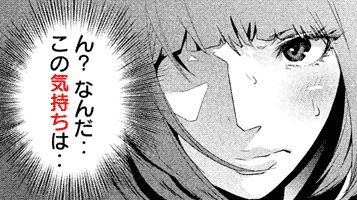
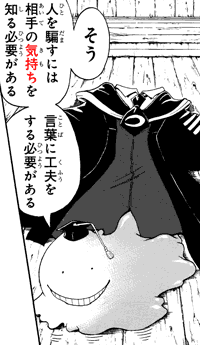
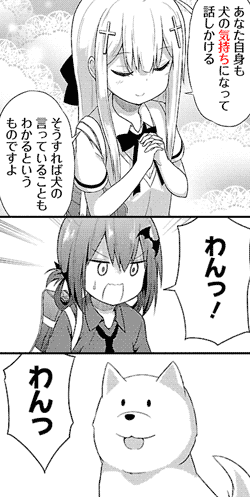
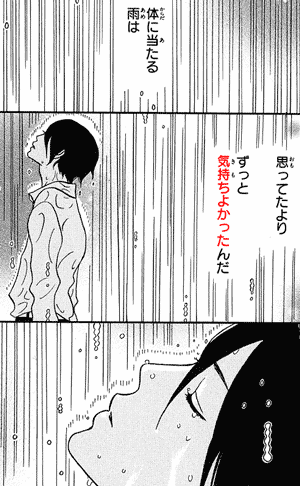
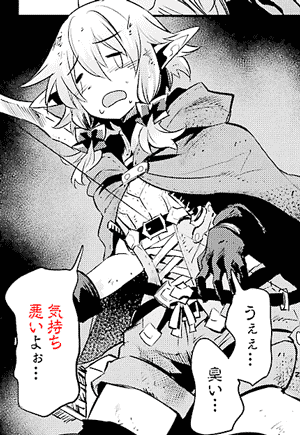
Now that you said don't search that word, I'm curious. Anyway tnx.
ReplyDeleteNOW I regret myself for not listening to the advice and searched for it.. Haha Gg
ReplyDeleteNow i regret searching it..
ReplyDeletekimochi=feeling as per my idea,my friends
ReplyDelete